Electrical resistance of certain materials,knows as superconductors, changes abruptly from a nonzero value to zero as their temperature is lowered below a critical temperature TC(0)
An interesting property of superconductors is that their critical temperature becomes smaller than TC(0) if they are placed in a magnetic field i.e., the critical temperature TC (B) is a function of the magnetic field strength B . The dependence of TC (B) is shown in the fig
In the graphs ahead, the resistance R of a superconductor is shown as a function of its temperature T for two different magnetic field B1 (solid line) and B2 (dashed line). If B2 is larger than B1 which of the following graphs shows the correct variation of R with T in these fields ?
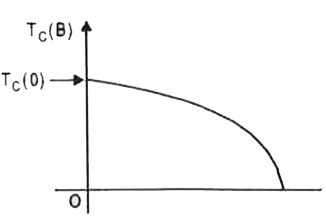
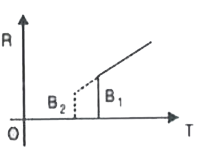
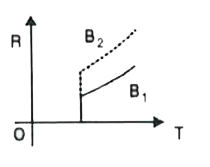
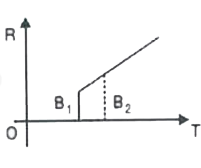
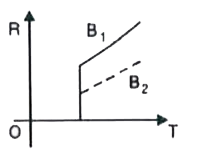
The correct Answer is:A
TB2 should be less than TB1 and above critical temperature, resistance independent of B identical graph .
Topper's Solved these Questions
- 15 MAGNETIC EFFECTS OF CURRENTSBOOK - MODERN PUBLICATIONCHAPTER - 15 MAGNETIC EFFECTS OF CURRENTSEXERCISE - Multiple choice questions (Level - III)
14 Videos
- 15 MAGNETIC EFFECTS OF CURRENTSBOOK - MODERN PUBLICATIONCHAPTER - 15 MAGNETIC EFFECTS OF CURRENTSEXERCISE - Recent Competitive Questions
31 Videos
- 15 MAGNETIC EFFECTS OF CURRENTSBOOK - MODERN PUBLICATIONCHAPTER - 15 MAGNETIC EFFECTS OF CURRENTSEXERCISE - Multiple choice questions (Level - II)
22 Videos
- ATOMS, MOLECULES AND NUCLEIBOOK - MODERN PUBLICATIONCHAPTER - ATOMS, MOLECULES AND NUCLEIEXERCISE - Recent Competitive Questions
40 Videos
Similar Questions
Electrical resistance of certain materials, known as superconductors, changes abruptly from a nonzero value of zero as their temperature is lowered below a critical temperature TC(0). An interesting property of super conductors is that their critical temperature becomes smaller than TC(0) if they are placed in a magnetic field, i.e., the critical temperature TC(B) is a function of the magnetic field strength B. The dependence of TC(B) on B is shown in the figure.
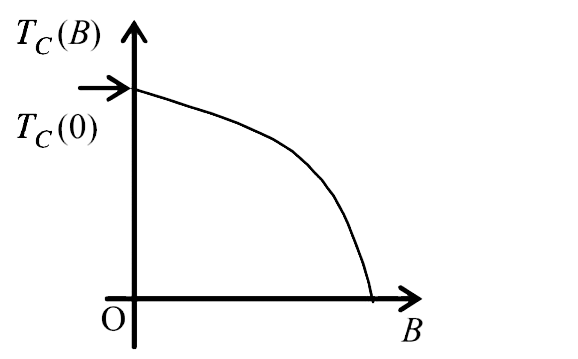 .
.
In the graphs below, the resistance R of a superconductor is shown as a function of its temperature T for two different magnetic fields B1(solid line) and B2 (dashed line). If B2 is larget than B1 which of the following graphs shows the correct variation of R with T in these fields?
View SolutionElectrical resistance of certain materials, known as superconductors, changes abruptly from a nonzero value of zero as their temperature is lowered below a critical temperature TC(0). An interesting property of super conductors is that their critical temperature becomes smaller than TC(0) if they are placed in a magnetic field, i.e., the critical temperature TC(B) is a function of the magnetic field strength B. The dependence of TC(B) on B is shown in the figure.
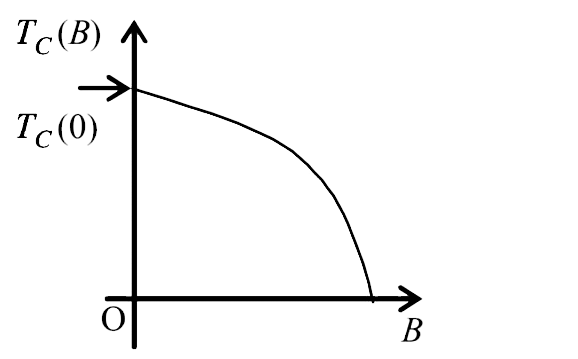 .
.
A superconductor has TC(0)=100K. When a magnetic field of 7.5 Tesla is applied , its TC decreases to 75 K. For this material one can difinitely say that when
View Solution
Knowledge Check
Electrical resistance of certain materials, known as superconductors, changes abruptly from a nonzero value of zero as their temperature is lowered below a critical temperature TC(0). An interesting property of super conductors is that their critical temperature becomes smaller than TC(0) if they are placed in a magnetic field, i.e., the critical temperature TC(B) is a function of the magnetic field strength B. The dependence of TC(B) on B is shown in the figure.
 .
.
In the graphs below, the resistance R of a superconductor is shown as a function of its temperature T for two different magnetic fields B1(solid line) and B2 (dashed line). If B2 is larget than B1 which of the following graphs shows the correct variation of R with T in these fields?A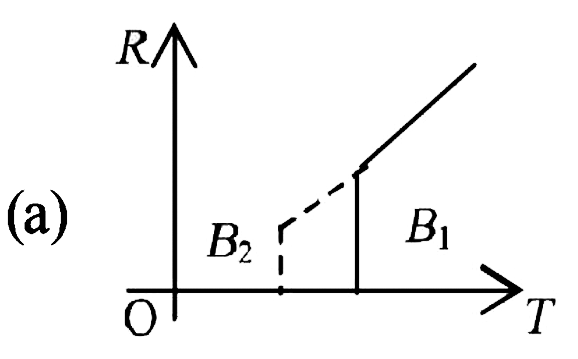 B
B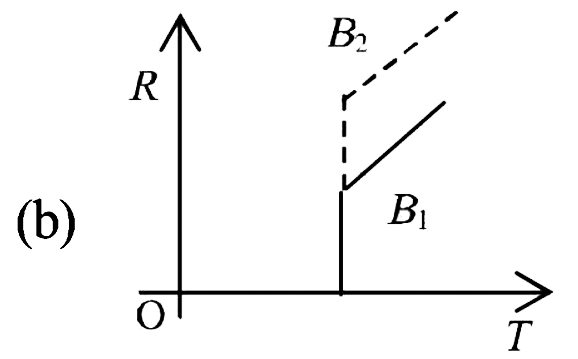 C
C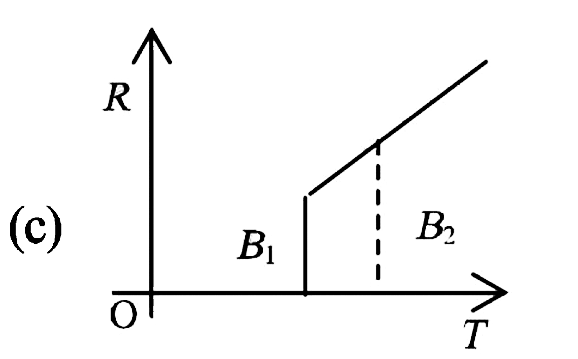 D
D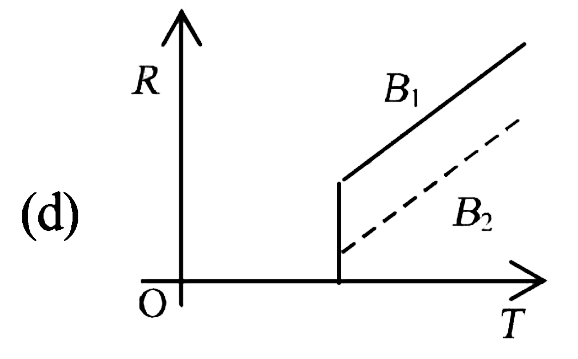
At the critical temperature
Aliquid and vapour exist in equilibriumBvapour state does not exist at allCthe meniscus between liquid and vapour disappearsDthe vapour condense into solidAt the critical temperature , the substance exists as a
ALiqued and vapour exist in equilibriumBvapour state does not exist at allCthe meniscus between liquid and vapour disappearsDthe vapour condense into solid
Electrical resistance of certain materials, known as superconductors, changes abruptly from a nonzero value of zero as their temperature is lowered below a critical temperature TC(0). An interesting property of super conductors is that their critical temperature becomes smaller than TC(0) if they are placed in a magnetic field, i.e., the critical temperature TC(B) is a function of the magnetic field strength B. The dependence of TC(B) on B is shown in the figure.
 .
.
A superconductor has TC(0)=100K. When a magnetic field of 7.5 Tesla is applied , its TC decreases to 75 K. For this material one can difinitely say that when
View SolutionAt critical temperature:
View SolutionElectrical resistance of certain materials, known as superconductors, changes abruptly from a nonzero value of zero as their temperature is lowered below a critical temperature TC(0). An interesting property of super conductors is that their critical temperature becomes smaller than TC(0) if they are placed in a magnetic field, i.e., the critical temperature TC(B) is a function of the magnetic field strength B. The dependence of TC(B) on B is shown in the figure.
 .
.
A superconductor has TC(0)=100K. When a magnetic field of 7.5 Tesla is applied , its TC decreases to 75 K. For this material one can difinitely say that when
View SolutionElectrical resistance of certain materials, known as superconductors , changes abruptly from a non-zero value to zero as their temperature is lowered below a critical temperature Tc(0) An interesting property of superconductors is that their critical temperature becomes smaller than Tc(0) if they are placed in a magnetic field, that is, the critical temperature Tc(B) is a function of the magnetic field strength B. The dependence of Tc(B) on magnetic field is shown in the below figure .
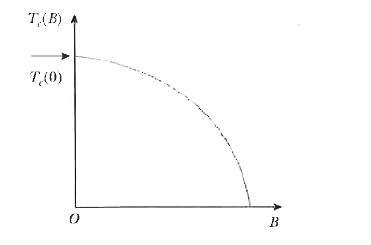
A superconductor has Tc(0)=100K. When a magnetic field of 7.5T is applied, its Tc decreases to 75K. For this material, one can definetly say that when
View SolutionElectrical resistance of certain materials, known as superconductors, changes abruptly from a nonzero value to zero as there is lowered below a critical temperature TC(0). An interseting property of supercoductors is that their critical temperature becomes smaller than TC(0) if they are placed in a magnetic field , i.e., the critical temperature TC(B) on B si shown in the figure.
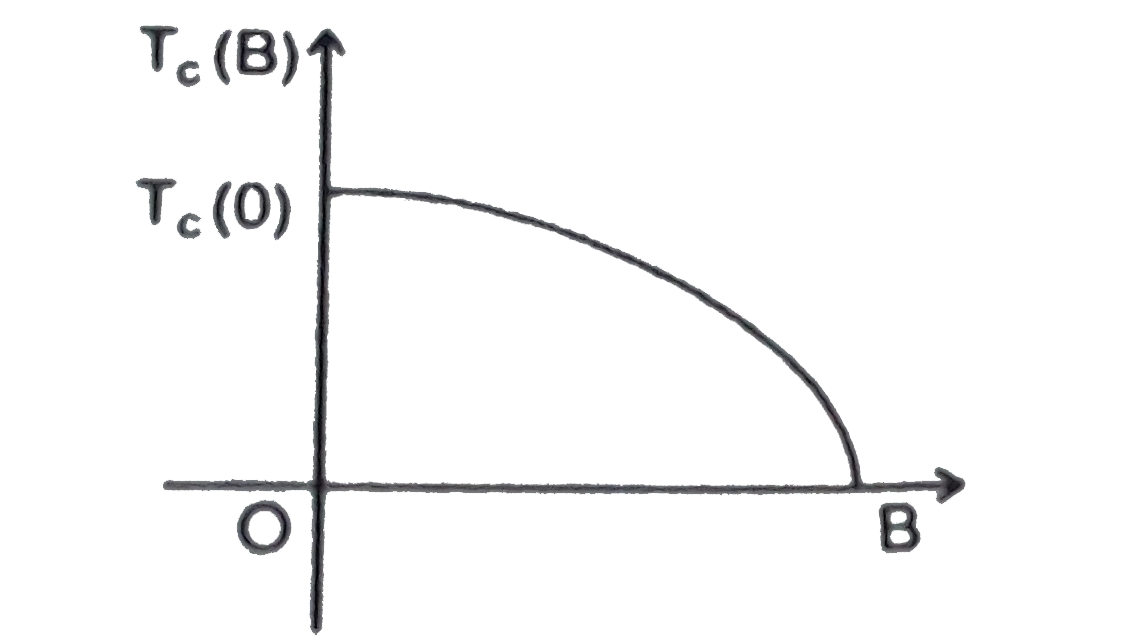
A superconductor has TC(0)=100K. When a magnetic field of 7.5 Tesla is applied , its TC decreases to 75 . For this material one can definitely say that when :
View Solution
